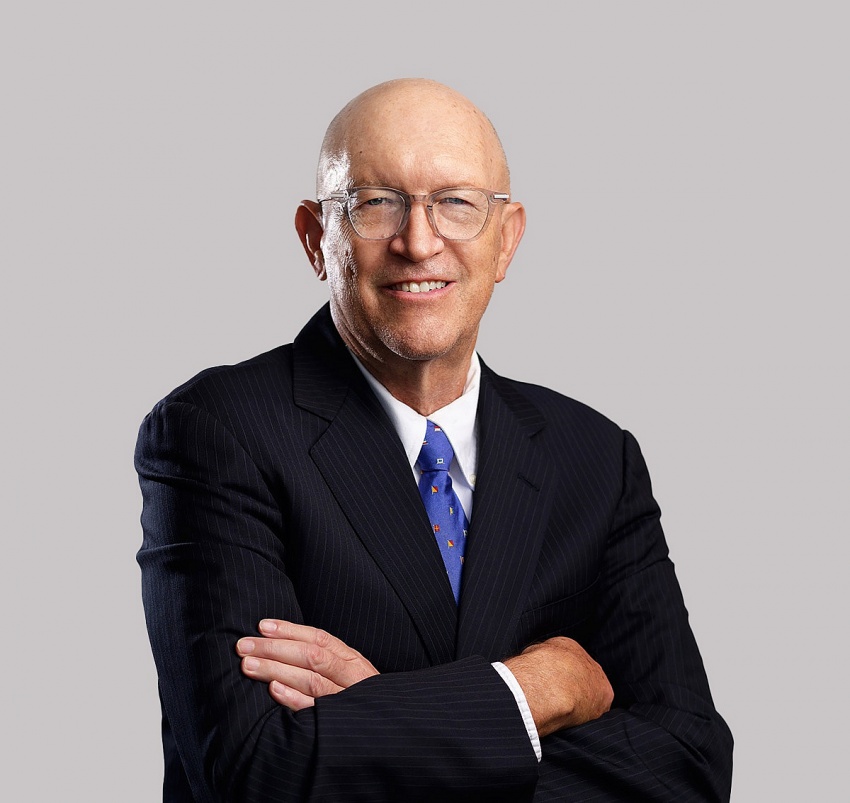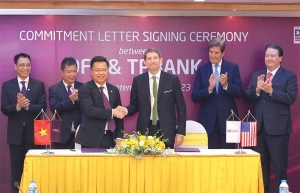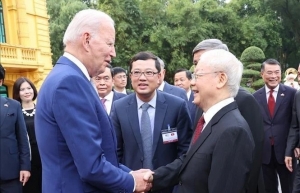A driving force to connect the Vietnam-US relationship
Born in Michigan in the United States, Lalonde has always had a deep passion for travel. During his third year of university, he chose to study abroad in Turkey, where he lived with a local family and even played on a professional basketball team.
 |
| Bradley Lalonde |
“I immersed myself in the local culture, which shaped my career in profound ways,” he recalled. It was during his time in Turkey that he switched his major from Chemistry to Political Science, focusing on the Middle East during the 1970s. He graduated with distinction from University of Michigan in 1975.
After completing his undergraduate studies, Lalonde pursued a graduate degree at Columbia University, specialising in International Economics with a focus on the Middle East. Initially, he thought his future lay in diplomacy or working at the World Bank, but his studies led him into international banking instead.
He interviewed with banks and started a career at Chemical Bank, then moved to Citibank. Lalonde’s career took him to various parts of the region, including managing Citibank branches in Izmir and Ankara, Turkey. He later founded Citibank Tunisia, where he worked for five and a half years. In 1994, Citibank invited him to Vietnam to establish a branch.
When Lalonde first arrived, the banking industry was still in its early stages, but Lalonde quickly saw massive growth opportunities. “In the past three decades, Vietnam’s banking sector has evolved greatly, but there’s still so much room for growth and innovation,” he observed.
One of his most memorable experiences came in 1995 when he accompanied President George H.W. Bush on a visit to Vietnam. When asked how the Vietnamese people treated him, Lalonde explained that they were incredibly welcoming. “Their hospitality made me feel at home, which is why I’ve remained attached to Vietnam for so long,” he said.
Lalonde also revealed that Citibank’s role in Vietnam went beyond typical banking operations. “We didn’t just enter the market as a commercial bank; we saw ourselves as an ‘educational bank’. We’ve trained countless employees and helped shape the market for future generations. Some of our team members have been with Citibank for over 30 years,” he said.
Connecting Vietnam and the US
Citibank played a vital role in fostering reconciliation and strengthening relations between Vietnam and the US, particularly in the Vietnam-US Bilateral Trade Agreement (BTA) and paving the way for Vietnam’s accession to the World Trade Organization (WTO).
Lalonde’s leadership in promoting the BTA earned him an invitation to testify before the US Congress, where he helped shift the perspectives of sceptics who doubted Vietnam’s readiness for the agreement. In his testimony, Lalonde emphasised the mutual benefits of the BTA for both countries. He also highlighted the pride among Citibank employees and the sense of hope the bank brought to Vietnam’s expanding economy.
Looking back, Lalonde took great pride and found encouragement in Citibank’s strong relationship with Deputy Prime Minister Vo Van Kiet. He recalled a banking conference organised by Citibank, which included the participation of the DPM and the governor of the State Bank of Vietnam, demonstrating how Citibank could support Vietnam’s financial development, similar to its impact in Malaysia. The DPM was impressed by Citibank’s success in Malaysia and believed the model could be replicated in Vietnam.
Though Citibank did not directly participate in the BTA or WTO negotiations, it played a significant role in advocating for financial services policies. One major achievement was Citibank’s ability to conduct transactions in VND, a significant breakthrough at the time. “Being allowed to accept deposits in VND from both locals and foreigners was a major milestone,” Lalonde noted.
As a co-founder of the American Chamber of Commerce in Vietnam in 1994 and a former executive director in Ho Chi Minh City and Danang, Lalonde sees Vietnam’s investment landscape as highly diverse, with opportunities across sectors such as automobiles, energy, and technology. He believes each sector has its own appeal based on strengths and strategic goals.
Lalonde stresses that trade and investment should be reciprocal. Vietnam should encourage its domestic enterprises to invest in the US, not only to enhance trade but to foster a sustainable economic relationship. He cited Nike as an example, explaining that while production is in Vietnam, the company’s largest profits come from US retail. Investing in both markets helps maximise profits and secure business operations.
To pull in more foreign investment, Lalonde suggests that Vietnam streamline administrative procedures and implement favourable tax policies.
“Foreign investment is often more complex than it seems, as multinational corporations tend to structure their investments through subsidiaries in foreign financial hubs. For instance, while Coca-Cola invests billions in Vietnam, these investments often flow through Singapore, making it appear that the capital comes from Singapore instead of the United States.”
Lalonde believes that a strong, two-way trade and investment relationship is essential for long-term success. Just as foreign companies invest in Vietnam, Vietnamese businesses should explore opportunities in international markets to expand their operations, following the model of successful global economies.
The focus to solve core issues
Lalonde has a clear vision for the country’s future development. He believes Vietnam must prioritise building a comprehensive North-South expressway system to improve the movement of goods and people. In addition, he advocates for a high-speed rail network linking major cities and the enhancement of inland waterways, which would significantly benefit transportation and the economy.
“Infrastructure is the bedrock of any nation’s development. However, Vietnam’s greatest challenge isn’t a lack of capital, but the need for streamlined investment processes and faster, more proactive decision-making,” he explained.
Lalonde sees Vietnam as a key player in the global economy, with strong trade partnerships spanning the United States, China, Singapore, and Thailand. These diversified relationships provide stability and make Vietnam an increasingly attractive destination for foreign investment.
Despite its progress, Vietnam still trails behind regional powerhouses like China, Thailand, and Singapore. To become a high-income nation by 2045, Lalonde insists that Vietnam must unlock the potential of its private sector, which currently contributes only about 10 per cent to the country’s GDP – far behind China’s 45 per cent.
Lalonde envisions significant opportunities for growth and recommends a series of measures to propel the private sector forward, including simplifying admin procedures and lowering legal compliance costs; boosting competitiveness through technology innovation and deeper integration into global value chains; expanding capital markets to facilitate access to funding for businesses; and investing in education and skills training, among many other factors.
If these reforms are implemented, Lalonde is confident the private sector will become a major driver of Vietnam’s economy, helping the nation achieve its ambition of becoming a high-income and sustainable economy.
Lalonde firmly believes that entrepreneurship is key to empowering the people of Vietnam – a philosophy that has guided Citibank’s mission since its entry into the country. Beyond training its employees, Citibank has partnered with numerous universities to advance education, including collaborations with Cal Poly in California and Hanoi Business School, alongside Dartmouth College’s Tuck School of Business.
These initiatives have helped cultivate a new generation of talented leaders, significantly contributing to Vietnam’s economic growth.
Lalonde views education as the foundation of success, particularly in the digital era. He is currently developing plans to establish an independent institute for innovation and entrepreneurship, in partnership with leading universities. “This institute will focus on comprehensive training programmes, in-depth research, and fostering Vietnam’s startup ecosystem through events and initiatives aimed at budding entrepreneurs,” he said.
While Lalonde champions foreign investment in Vietnam, he stresses the importance of Vietnamese businesses expanding globally. He envisions Vietnam becoming a prosperous country like South Korea by encouraging its enterprises to invest abroad. In particular, he is interested in the US Midwest, where he was born, and proposes the establishment of Vietnam trade and investment promotion centres in cities like Detroit and Chicago.
“As the industrial and food distribution hub of the US, the Midwest presents an ideal destination for Vietnam to leverage its strengths in food production and other industries,” Lalonde said.
Among his career accomplishments, Lalonde is most proud of building a model Citibank branch in Vietnam. He has mentored and trained many outstanding employees who have gone on to achieve great success. He also takes pride in Citibank’s social programmes, such as micro-lending initiatives through Save the Children, which have empowered rural women to improve their families’ nutrition.
Citibank’s contributions extend to education, including its support for the Hanoi Business School, and various charitable activities. Lalonde has spearheaded fundraising for children with disabilities, collaborated with Johns Hopkins University to assist Vietnamese children with cerebral palsy, and supported initiatives like Operation Smile and rehabilitation programmes for veterans, including providing prosthetic limbs.
Despite reaching the age of 70, Lalonde has no plans to retire. For him, time has become his most valuable asset, and he is committed to using it wisely. His current focus is on projects related to sustainable technology, education, and healthcare – areas he is deeply passionate about.
| Bradley Lalonde has nearly 45 years of experience in banking and finance, holding key positions such as regional business director at Citibank Vietnam and Tunisia, director of CitiCapital, and executive director of Vietnam Partners LLC Investment Fund. In 1994, he became Citibank’s first representative in Vietnam, establishing branches in both Hanoi and Ho Chi Minh City. He also served as the founder and first elected president of the American Chamber of Commerce in Vietnam. Lalonde played a pivotal role in normalising Vietnam-US relations during the 1990s, testifying before the US Congress on the importance of trade and investment ties with Vietnam. He also contributed to Vietnam’s accession to the World Trade Organisation in 2007. |
 | US banks push deals in Vietnamese market US financial institutions and digital payment innovators are intensifying their capital commitments to the burgeoning Vietnamese market. |
| PM calls on US semiconductor firms to invest more in Vietnam Prime Minister Pham Minh Chinh had a working lunch with chief executive officers of leading US enterprises in the semiconductor industry in Washington DC on September 19 morning (local time). |
 | Imprints of Party Secretary General Nguyen Phu Trong in Vietnam-US relations US politicians and officials with close engagement with Vietnam have shared their stories and recognised General Secretary of Communist Party of Vietnam (CPV) Central Committee Nguyen Phu Trong's imprints in elevating Vietnam-US relations to new heights. |
 | Vietnam well-positioned for US groups Interest from the United States is riding high after trade ties were advanced just under a year ago. Winnie Wong, vice chairwoman of the American Chamber of Commerce in Ho Chi Minh City, spoke with VIR’s Bich Ngoc about the recent wave of US investment into Vietnam. |
What the stars mean:
★ Poor ★ ★ Promising ★★★ Good ★★★★ Very good ★★★★★ Exceptional
Related Contents
Latest News
More News
- SK Innovation-led consortium wins $2.3 billion LNG project in Nghe An (February 25, 2026 | 07:56)
- THACO opens $70 million manufacturing complex in Danang (February 25, 2026 | 07:54)
- Phu Quoc International Airport expansion approved to meet rising demand (February 24, 2026 | 10:00)
- Bac Giang International Logistics Centre faces land clearance barrier (February 24, 2026 | 08:00)
- Bright prospects abound in European investment (February 19, 2026 | 20:27)
- Internal strengths attest to commitment to progress (February 19, 2026 | 20:13)
- Vietnam, New Zealand seek level-up in ties (February 19, 2026 | 18:06)
- Untapped potential in relations with Indonesia (February 19, 2026 | 17:56)
- German strengths match Vietnamese aspirations (February 19, 2026 | 17:40)
- Kim Long Motor and AOJ Suzhou enter strategic partnership (February 16, 2026 | 13:27)

 Tag:
Tag:




















 Mobile Version
Mobile Version